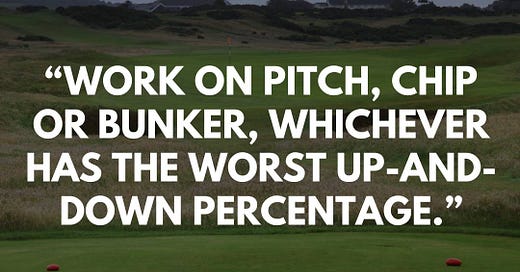The Golf Book Club: Every day, we share a mental game lesson inspired by great golf books—stories and strategies to help you think better so you can play better.
Your practice isn’t helping you score.
Chris Passarella is the sports psychologist at the Academy. He helps each student develop positive self-talk, confidence and resilience.
But he also teaches a skill we don’t often associate with psychology: a short game mindset.
Over the years, he discovered a fundamental truth about junior golfers. And this will make you smile, because it’s a fundamental truth about most of us as well.
Junior golfers would rather swing on the range than work around the green. It was more fun to crush a golf ball into the air than roll a golf ball into the cup.
Which is fine, until you step onto the golf course and realize your practice isn’t helping you score.
“Pitch, chip or bunker shot.”
Chris worked with the golf instructors to develop a plan based on stats and schedules.
Students were responsible for tracking their up-and-down stats on the golf course. When pitching from within 100 yards, how often do you get up-and-down? How often when chipping around the green? How often when hitting out of a bunker?
Next, short game practice was scheduled like a class you couldn’t miss. If they wanted to hit more buckets, they had to do it before or after their short game timeslot.
When they met on the practice green, the teacher said, “Okay, I want you working on one of three things: pitch, chip or bunker shot, whichever has the worst up-and-down percentage.”
Most of the kids resisted. Like many of us, they thought that practicing the short game was boring.
But then they compared stats.
“There’s no way you get up-and-down from the sand more than I do.”
“Oh yeah? Well, there’s no way you’re better with a pitching wedge than I am.”
They got competitive with each other.
Then they did the math.
“If I improve my bunker stat, I’ll save two strokes. If I improve my chipping stat, I’ll save three!”
They got competitive with themselves.
Competition, whether with friends or with yourself, is many things. But it’s never boring.
The plan wasn’t magic. The kids still liked the driving range more than the practice green. But now, when they stepped on the golf course, their practice helped them score—and making that connection made all the difference.
Mother Teresa said, “Be faithful in small things because it is in them that your strength lies.”
Today’s lesson was designed for juniors. But in golf, we all act immature sometimes. We don’t do the small things that can make the biggest impact on our handicaps. So take a page from the Academy.
Track your up-and-down stats: pitching, chipping, and bunkers. Then practice the skill that needs the most work. We’re only talking about a few minutes each week.
But if you use your stats wisely, and schedule your time like it’s an unmissable class or a meeting at work, then those few minutes will take a few strokes off your score.
That’s all for now. Until next time, keep imagining what’s possible.
THE GOLF BUCKET LIST
Royal Porthcawl Golf Club, Wales: Approach on 4




